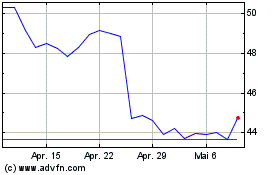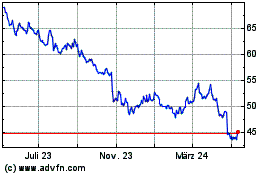Celgene Deal Faces Antitrust Delays -- WSJ
25 Juni 2019 - 9:02AM
Dow Jones News
By Joseph Walker
This article is being republished as part of our daily
reproduction of WSJ.com articles that also appeared in the U.S.
print edition of The Wall Street Journal (June 25, 2019).
Bristol-Myers Squibb Co. said its $74 billion merger with
Celgene Corp. would be delayed as the company works to allay
concerns of federal regulators by selling off Otezla, Celgene's
anti-inflammatory drug that had global sales of $1.6 billion last
year.
Bristol-Myers now expects to complete the deal at the end of
this year or early 2020, the company said Monday. It had previously
expected the merger to close in the third quarter of this year.
The company hopes the planned divestiture of Otezla will resolve
the U.S. Federal Trade Commission's anticompetitive concerns about
clearing the merger.
The divestiture came as a surprise to analysts, who said it was
the latest signal that regulators are taking a tougher stance in
their scrutiny of pharmaceutical industry mergers.
The delay appeared to create uncertainty among investors about
the merger being completed, analysts said. Celgene's stock fell
5.5% to $93.47 Monday; shares of Bristol-Myers declined 7.4% to
$45.68.
Brian Skorney, an R.W. Baird analyst, said Bristol-Myers's plan
to divest itself of Otezla signaled the company had found a way to
resolve the FTC's concerns and increased the probability of the
deal closing.
"It's feedback on what the FTC wants, and it seems like this is
the major thing to come from the FTC discussions," Mr. Skorney said
in an interview.
Otezla is used to treat forms of psoriasis, a skin-disease in
which an overreaction by the immune system causes itchy rashes to
form on the body. Bristol doesn't currently sell psoriasis
medicines, but has an experimental drug for the disease in
late-stage trials.
Historically, antitrust regulators would only raise concerns
about drugs in overlapping disease areas if both products were
already on the market, Mr. Skorney said. That now appears to be
changing.
Earlier this month, Roche Holding AG said the FTC had requested
additional information regarding its planned takeover of Spark
Therapeutics Inc.
Analysts speculated that the FTC's concerns were related to
overlap between Roche's hemophilia treatment Hemlibra and an
experimental gene therapy for the disease being developed by
Spark.
"Both of these deals have gotten more scrutiny than people
expected," said Mr. Skorney. "How does that impact how pharma
acquirers look at deals going forward?"
Otezla was Celgene's third-largest drug by sales last year and
represented about 10.6% of the company's total revenue.
It is uncertain how long the drug will retain market
exclusivity; R.W. Baird estimates that it could lose patent
protection after 2023. Otezla could fetch $6 billion to $10 billion
in a sale, Mr. Skorney said.
Separately, New York-based Bristol Myers said Monday that its
late-stage study of cancer immunotherapy Opdivo didn't meet the
main goals in a study probing its use in a common liver cancer but
showed an improvement in the overall survival of patients treated
with the drug compared with Bayer AG's Nexavar, which is the
current standard of treatment.
Kimberly Chin and Dave Sebastian contributed to this
article.
Write to Joseph Walker at joseph.walker@wsj.com
(END) Dow Jones Newswires
June 25, 2019 02:47 ET (06:47 GMT)
Copyright (c) 2019 Dow Jones & Company, Inc.
Bristol Myers Squibb (NYSE:BMY)
Historical Stock Chart
Von Mär 2024 bis Apr 2024

Bristol Myers Squibb (NYSE:BMY)
Historical Stock Chart
Von Apr 2023 bis Apr 2024
